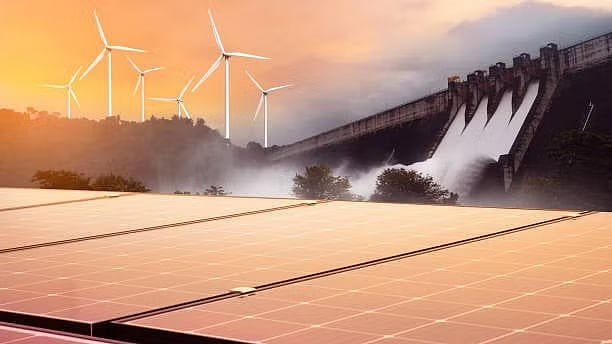
Representational illustration showing renewable energy sources.
Credit : iStock Photo
New Delhi: The Budget announcements related to critical minerals and green transition will not only make India self reliant in resources but also help in meeting net-zero goals, energy industry players said.
In her Budget speech on Tuesday, Finance Minister Nirmala Sitharaman announced a slew of measures for sectors including infrastructure, manufacturing, healthcare, education, startups, and green energy, among others.
Amit Rautela, CFO of state-owned Meja Urja Nigam said the Budget has strategically addressed present requirement of thermal power with a focus on Advanced Ultra Super Critical (AUSC) technology through joint venture route. Further, duty related measures for critical minerals will make the country self reliant in these important resources.
According to Rahul Walawalkar, President of India Energy Storage Alliance (IESA), the announcement for pumped hydro storage in budget is a key step for supporting long duration energy storage technologies. Abolishment of angel tax is a great and long overdue step boosting investors' confidence and the promising EV and clean tech startup ecosystem.
Chetan Shah, CMD Solex Energy said the extension of Production-Linked Incentive (PLI) scheme with a Rs 5,000 crore allocation for solar PV manufacturing will significantly reduce import dependence and boost domestic production. Additionally, the Rs 10,000 crore fund for solar infrastructure development, including solar parks and grid integration, is a pivotal step towards achieving renewable energy targets.
According to Hanish Gupta, Founder-CEO Sunkind Energy, the budget marks a seminal shift for India's renewable energy sector. By equipping 1 crore households with rooftop solar panels through PM Surya Ghar Muft Bijli Yojana, the government is taking a big step toward reducing the country's reliance on fossil fuels and reshaping the energy future.
Amit Paithankar, CEO, Waaree Energies said the expansion of the list of exempted capital goods for solar manufacturing may further strengthen the country's ability to enhance domestic production capabilities, reducing reliance on imports and fostering self-reliance. Additionally, guidelines for energy efficiency and emission targets for 'hard to abate' industries may reduce India's carbon footprint.
Anil Rawal, MD & CEO, IntelliSmart Infrastructure said, "the budget aligns well with our commitment to development and climate action, targeting the goal of 500 GW of renewable energy capacity by 2030. Through smart meter rollouts, smart energy management, and reducing AT&C losses for discoms, we are dedicated to supporting this growth-oriented and pro-development agenda."
According to Srivatsan Iyer, Global CEO, Hero Future Energies, the focus on transitioning 'hard to abate' industries to greener alternatives will catalyze the commercial and industrial (C&I) sector's journey towards net-zero. Introduction of a taxonomy for climate finance will help attract much needed capital for boosting climate resilience.
Raman Bhatia, Founder & MD, Servotech Power Systems said, "The increase of duty on non-biodegradable PVC flex banners from 10 per cent to 25 per cent is a commendable step towards environmental conservation, and projects including setting up of a 2400 MW power unit will add Bihar in the category of solar powered states."
Gautam Mohanka, CEO, Gautam Solar said the PM Surya Ghar Muft Bijli Yojana is a reflection of the Prime Minister’s vision of 'Vocal for local', and is expected to be a catalyst in the energy sector by improving accessibility and affordability on the demand side and boosting resource efficiency and high-tech manufacturing on the supply side.
"In addition, the announced support for pump storage projects is crucial for maintaining grid stability. All in all, these measures are expected to enable industry participants to produce cost-effective energy solutions, foster job creation in the renewable energy sector, and support India's sustainability goals," he added.
The PM Surya Ghar Muft Bijli Yojana was rolled out earlier this year. In line with the announcement in the interim budget, the scheme has been launched to install rooftop solar plants to enable 1 crore households obtain free electricity up to 300 units every month.